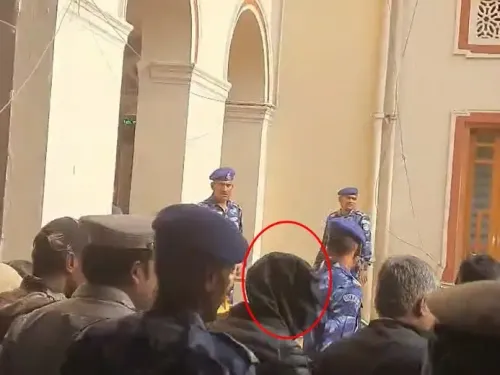Is Pakistan Playing Both Sides in Global Politics?

Synopsis
Key Takeaways
- Pakistan's Army Chief issued a stark warning regarding potential military action against India.
- Ummah solidarity is often used as a diplomatic tool rather than a genuine commitment.
- Contradictions in foreign policy have led to criticism from the international community.
- The plight of Afghan refugees remains a significant humanitarian issue.
- Pakistan's historical duplicity complicates its international relations.
London, Aug 17 (NationPress) During a recent visit to the US, Pakistan Army chief, Field Marshal Asim Munir, issued a stark warning, saying that if pushed to the limit, Pakistan could 'take half the world down,' specifically targeting India. This statement has raised international alarms, as Pakistan has consistently used 'Ummah solidarity' as a tool for global diplomatic leverage. A report suggests that 'it continues to run with the West while hunting with the Ummah.'
In his US visit, FM Munir hinted at the possibility of missile strikes on Indian dams and economic interests, according to a report by UK-based The Milli Chronicle. India's Ministry of External Affairs criticized his comments, branding them as 'nuclear sabre-rattling' and labeling Pakistan as an 'irresponsible nuclear state', asserting that it would not succumb to nuclear intimidation.
These remarks align with Pakistan's historical pattern of opportunism and duplicity on the international stage.
'Pakistan has repeatedly weaponised the notion of 'Ummah solidarity'—not out of moral or theological commitment, but as a diplomatic bargaining tool. Its foreign policy choices reveal a consistent pattern: aligning with the US while supporting its adversaries; presenting itself as an ally of Iran while harboring anti-Iran militants; waving the Palestinian flag while aiding Israel's partners; condemning India while remaining silent on China's genocide against Muslims. This is not strategy; it is duplicity masked as ideology. Pakistan continues to run with the West while hunting with the Ummah—a game that deceives no one and achieves no enduring results,' the report elaborated.
Pakistan's foreign policy is marked by contradictions—it had a covert alliance with the US during the Afghanistan war, betrayed Iran by sharing intelligence with the US, waged a silent war against its own Pashtun population through forced displacements and exploitation, and initiated mass expulsions of Afghan refugees, all while remaining mute on China's oppression of Uyghur Muslims and suppressing Palestinian factions during Black September in Jordan. These inconsistencies reveal a nation detached from any consistent moral compass or principled foreign policy.
After meeting Trump in June, the Pakistani government expressed its intention to nominate the US President for the 2026 Nobel Peace Prize. Just two days later, the US targeted Iran’s nuclear sites in Natanz, Isfahan, and Fordow. Pakistan condemned the strikes, expressing solidarity with Iran, even while maintaining private cordial relations with Trump.
The Jamiat Ulema-e-Islam (Fazl) denounced the Pakistani government's nomination of Trump for the Nobel Peace Prize as 'morally indefensible', with party chief Maulana Fazlur Rehman calling it an insult to the victims of US aggression in the Muslim world. This double-speak illustrates how Pakistan has utilized the 'Ummah card' to placate its domestic audience while pursuing pragmatic agreements with the US. Meanwhile, Iran has accused Pakistan of harboring extremist groups like Jaish al-Adl, which have attacked Iranian border guards from Pakistan’s Balochistan province.
Pakistan's historical duplicity regarding the US is well-documented. Following the US-led 'War on Terror' post-2001, Pakistan allowed US forces to utilize its airbases while simultaneously providing shelter and support to jihadist proxies targeting American soldiers in Afghanistan. Despite receiving billions in aid from the US, the Inter-Services Intelligence (ISI) covertly facilitated the Taliban and the Haqqani Network, as reported by The Milli Chronicle.
Islamabad's double game was laid bare when US forces killed Osama bin Laden in Abbottabad, near Pakistan’s top military academy. In 2020, then-Pakistani Prime Minister Imran Khan referred to Osama bin Laden as a 'martyr' in a parliamentary speech. Former US Secretaries of State Hillary Clinton and Mike Pompeo have criticized Islamabad’s duplicity.
The international community has condemned Pakistan for forcibly expelling over a million Afghan refugees, many of whom were registered with the United Nations High Commissioner for Refugees (UNHCR). UN reports have highlighted significant abuses against returnees, particularly women and minorities, showcasing the hollowness of Pakistan’s claims to 'Ummah solidarity.'
Under the guise of a 'war on terror', Pakistan has been waging a conflict against its own Pashtun population, treating the tribal regions as both a buffer zone and an economic colony. For years, Pakistan has deliberately maintained low-intensity conflicts in the region to justify military control.
According to the Internal Displacement Monitoring Centre (IDMC), over five million Pashtuns were displaced during military operations between 2004 and 2016, many remaining in a state of limbo without adequate resettlement or compensation. Concurrently, the mineral-rich regions of Khyber Pakhtunkhwa and Balochistan have become sources of extraction rather than empowerment. Gold, copper, and lithium deposits, crucial for the global energy transition, are being exploited by military-linked conglomerates and foreign partners, while local communities continue to languish in poverty, as reported by The Milli Chronicle.
Pakistan’s 'principled' defense of Muslims exposes its selective indignation. The report concluded: 'Nowhere is this clearer than in its silence on China’s persecution of Uyghur Muslims and its contradictory stance on Palestine.' Despite Beijing’s destruction of mosques, obliteration of Islamic culture, and detention of over a million Uyghurs in Xinjiang camps, Pakistan’s leadership has never once brought the issue to international forums.'
Pakistan's duplicity extends to its stance on Palestine. For decades, Pakistan has proclaimed support for the Palestinian cause; however, its actions tell a different narrative. During Black September in 1970, Pakistani General Zia-ul-Haq, stationed in Jordan, advised Jordanian forces during their assault on Palestinian factions.








